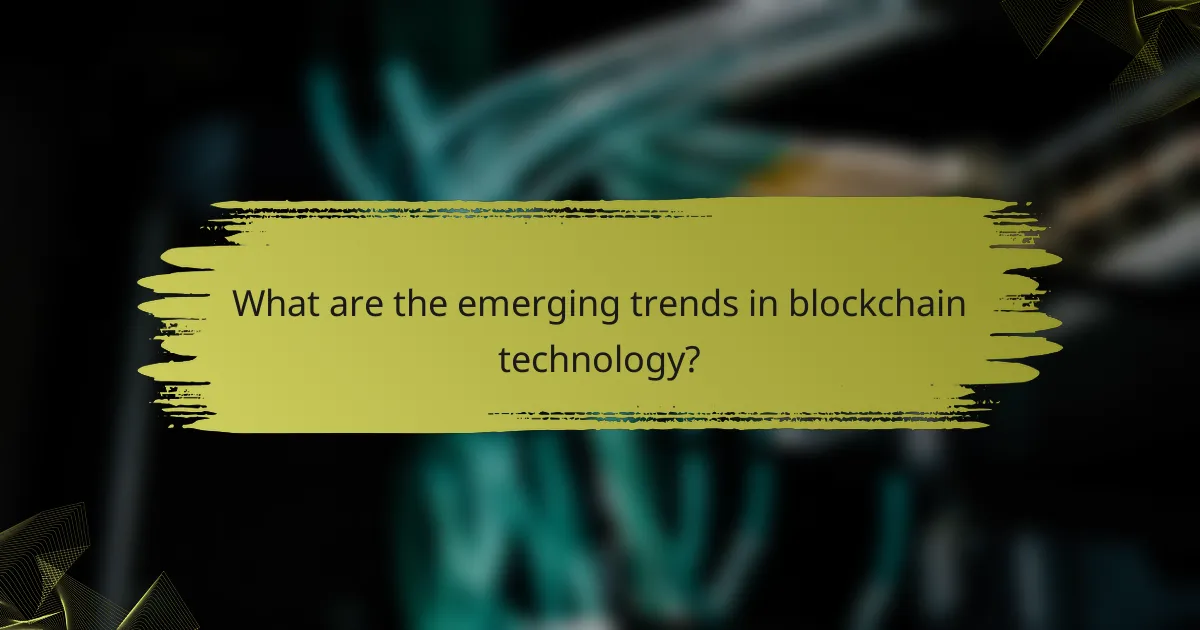Blockchain technology is revolutionizing various industries by providing enhanced transparency, security, and efficiency. Its applications span sectors such as supply chain management, healthcare, and finance, offering significant benefits like reduced costs and improved traceability. By enabling decentralized operations, blockchain fosters innovative project funding and development, making it a pivotal force in modern business practices.

What are the applications of blockchain technology?
Blockchain technology has a wide range of applications across various industries, enhancing transparency, security, and efficiency. Key sectors utilizing blockchain include supply chain management, healthcare, finance, smart contracts, and voting systems.
Supply chain management
In supply chain management, blockchain provides a decentralized ledger that tracks products from origin to consumer. This transparency helps reduce fraud, ensures authenticity, and enhances traceability, allowing businesses to verify the source of goods.
For example, companies can use blockchain to monitor the journey of food products, ensuring they meet safety standards and regulations. By implementing this technology, firms can improve operational efficiency and reduce costs associated with recalls or disputes.
Healthcare data management
Blockchain technology can revolutionize healthcare data management by securely storing patient records and ensuring data integrity. It allows for seamless sharing of medical information among authorized parties while maintaining patient privacy.
Hospitals and clinics can use blockchain to provide patients with control over their data, enabling them to grant access to healthcare providers as needed. This can lead to better coordinated care and improved patient outcomes.
Financial services
In the financial services sector, blockchain enhances transaction security and reduces processing times. By using decentralized ledgers, financial institutions can minimize fraud and streamline operations, making transactions faster and more cost-effective.
Cryptocurrencies like Bitcoin and Ethereum exemplify blockchain’s impact on finance, allowing for peer-to-peer transactions without intermediaries. Traditional banks are also exploring blockchain for cross-border payments and trade finance to improve efficiency.
Smart contracts
Smart contracts are self-executing agreements with the terms directly written into code on a blockchain. They automatically enforce and execute contractual obligations when predefined conditions are met, reducing the need for intermediaries.
For instance, in real estate, a smart contract can facilitate property transfers once payment is confirmed, ensuring a secure and efficient transaction process. This technology can significantly lower transaction costs and increase trust among parties involved.
Voting systems
Blockchain can enhance voting systems by providing a secure and transparent method for casting and counting votes. This technology helps prevent fraud and ensures the integrity of the electoral process.
By using blockchain, voters can verify their votes while maintaining anonymity. This can lead to increased public trust in elections and potentially higher voter turnout, as the process becomes more accessible and reliable.

What are the benefits of blockchain technology?
Blockchain technology offers several key benefits, including increased transparency, enhanced security, reduced costs, and improved traceability. These advantages make it an attractive option for various industries looking to optimize operations and build trust among stakeholders.
Increased transparency
One of the primary benefits of blockchain technology is its ability to provide increased transparency. Every transaction recorded on a blockchain is visible to all participants, creating an open and verifiable system. This transparency helps to reduce fraud and build trust among users.
For instance, in supply chain management, stakeholders can track the movement of goods in real-time, ensuring that all parties have access to the same information. This visibility can lead to better decision-making and accountability.
Enhanced security
Blockchain technology enhances security through its decentralized nature and cryptographic techniques. Each transaction is encrypted and linked to the previous one, making it nearly impossible to alter past records without consensus from the network. This feature significantly reduces the risk of hacking and unauthorized access.
Moreover, the use of consensus mechanisms, such as Proof of Work or Proof of Stake, ensures that all participants agree on the validity of transactions before they are added to the blockchain. This collective validation process strengthens the overall security of the system.
Reduced costs
Implementing blockchain technology can lead to reduced costs by streamlining processes and eliminating intermediaries. Traditional systems often require multiple parties to verify transactions, which can be time-consuming and expensive. Blockchain allows for direct peer-to-peer transactions, minimizing the need for third-party involvement.
For example, in financial services, blockchain can facilitate cross-border payments at a fraction of the cost compared to conventional methods. Businesses can save on transaction fees and processing times, leading to more efficient operations.
Improved traceability
Blockchain technology significantly improves traceability by providing a permanent and immutable record of transactions. This feature is particularly beneficial in industries such as food safety, pharmaceuticals, and luxury goods, where tracking the origin and journey of products is crucial.
With blockchain, companies can easily trace a product’s history from production to sale, ensuring compliance with regulations and enhancing consumer trust. For instance, a food company can quickly identify the source of contamination in the supply chain, allowing for swift action to protect public health.

How does blockchain influence projects in the United States?
Blockchain significantly influences projects in the United States by enabling transparency, security, and efficiency in various sectors. Its decentralized nature allows for innovative funding methods and the development of applications that operate without central authority.
Funding through Initial Coin Offerings (ICOs)
Initial Coin Offerings (ICOs) provide a method for projects to raise capital by issuing digital tokens in exchange for cryptocurrency. This funding approach allows startups to bypass traditional venture capital routes, making it accessible for a range of projects, from tech innovations to social initiatives.
However, ICOs come with risks, including regulatory scrutiny and potential scams. In the U.S., the Securities and Exchange Commission (SEC) has guidelines that classify certain tokens as securities, requiring compliance with federal laws. Projects should ensure they understand these regulations to avoid legal pitfalls.
Decentralized applications (dApps)
Decentralized applications (dApps) leverage blockchain technology to function without a central server, enhancing security and user control. These applications can operate across various industries, including finance, gaming, and supply chain management, offering unique solutions that traditional apps cannot.
When developing dApps, it’s crucial to consider factors such as user experience and scalability. Many successful dApps utilize Ethereum’s blockchain due to its robust smart contract capabilities. Projects should also be aware of the potential for high transaction fees during peak network usage, which can impact user adoption.

What are the key criteria for selecting a blockchain platform?
When selecting a blockchain platform, key criteria include scalability, security features, and community support. These factors significantly influence the platform’s performance, reliability, and long-term viability for your specific use case.
Scalability
Scalability refers to a blockchain’s ability to handle an increasing number of transactions efficiently. A scalable platform can accommodate growth without compromising speed or performance. Look for platforms that offer solutions like sharding or layer-2 scaling to enhance transaction throughput.
Consider the expected transaction volume of your application. Platforms like Ethereum may struggle with high loads, while others like Solana or Binance Smart Chain are designed for high scalability, supporting thousands of transactions per second.
Security features
Security features are critical in protecting data and assets on a blockchain. Evaluate the consensus mechanism, such as Proof of Work or Proof of Stake, as these directly impact the network’s resilience against attacks. A robust platform should also offer features like smart contract audits and encryption protocols.
Ensure the platform has a proven track record of security incidents and how they were handled. Platforms with active bug bounty programs often demonstrate a commitment to ongoing security improvements.
Community support
Community support plays a vital role in the sustainability of a blockchain platform. A strong developer community can lead to continuous improvements, updates, and a wealth of resources for troubleshooting. Look for platforms with active forums, documentation, and educational resources.
Assess the size and engagement of the community. Platforms like Ethereum have large, vibrant communities that contribute to a rich ecosystem of tools and applications, while newer or less popular platforms may lack this level of support.

What are the emerging trends in blockchain technology?
Emerging trends in blockchain technology include increased integration with the Internet of Things (IoT) and greater adoption for regulatory compliance. These trends highlight how blockchain can enhance connectivity and transparency in various sectors.
Integration with IoT
The integration of blockchain with IoT devices allows for secure and transparent data sharing among connected devices. This synergy can improve automation and efficiency in industries such as supply chain management, where tracking goods in real-time is crucial.
For example, using blockchain to record transactions from IoT sensors can ensure that data is tamper-proof and easily verifiable. This can help businesses reduce fraud and streamline operations, leading to cost savings and improved trust among stakeholders.
Adoption in regulatory compliance
Blockchain technology is increasingly being adopted for regulatory compliance, particularly in finance and healthcare. By providing a secure and immutable record of transactions, blockchain can help organizations meet compliance requirements more effectively.
For instance, financial institutions can use blockchain to maintain transparent records of transactions, making it easier to comply with anti-money laundering (AML) and know your customer (KYC) regulations. This not only enhances security but also reduces the burden of compliance-related paperwork and processes.



